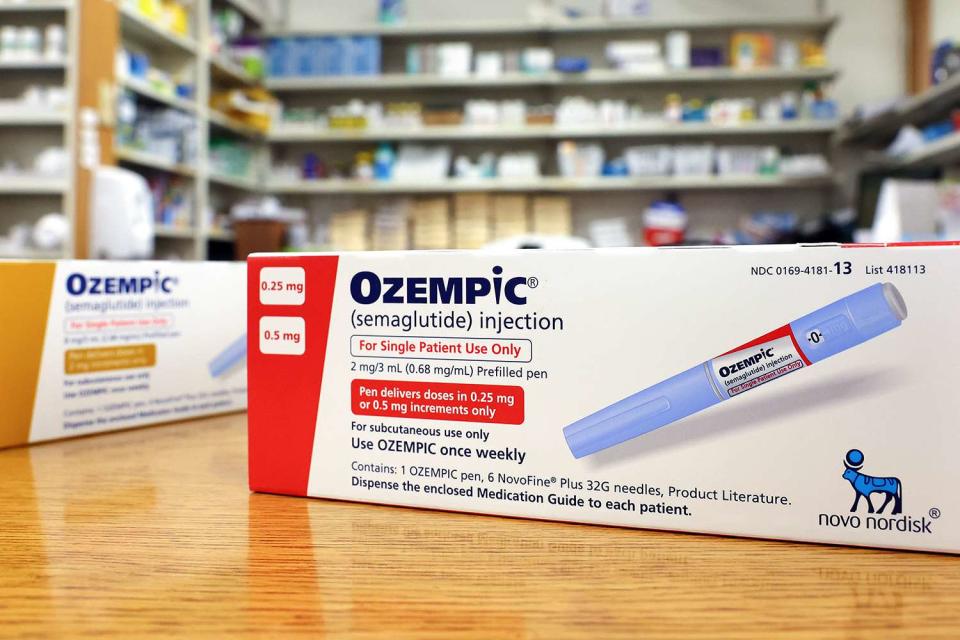FDA Updates Ozempic Label amid Reports of Intestinal Blockages
The FDA is updating Ozempic's warning label to acknowledge reports of bowel obstruction

Mario Tama/Getty Images
FDA Updates Ozempic Label Amid Concerns Over Intestinal Blockages Linked to Semaglutide-Based DrugsThe FDA has issued another update to the warning label for Ozempic, saying it has potential to cause a life-threatening intestinal blockage.
Amid growing concerns, the agency indicated that Ozempic can lead to a condition known as ileus—a type of bowel obstruction where either sections or the entirety of the intestines become obstructed. This blockage can restrict blood flow to organs, resulting in tissue necrosis.
The complication will be added to the drug's current list of side effects, which includes nausea, vomiting, diarrhea, and constipation.
Ozempic is an FDA-approved prescription medication for people with type 2 diabetes. It's one of the brand names for semaglutide and tirzepatide — also known as Wegovy and Mounjaro — which works in the brain to impact satiety, and is the latest Hollywood weight loss trend.
Related: Stars Who've Spoken About Ozempic — and What They've Said
The FDA collected over 8,500 reports of gastrointestinal issues associated with drugs such as Ozempic, as well as weight-loss medication Wegovy. Among these, 33 cases, which included two fatalities, specifically reference ileus as a side effect of medications containing semaglutide.
Both Mounjaro and Wegovy labels already caution about the risk of intestinal blockages. However, the label change was initiated after a Louisiana woman filed a lawsuit in August claiming she was “severely injured” after using Mounjaro and Ozempic. The woman claims that the pharmaceutical companies failed to disclose the drugs’ risk of causing vomiting and diarrhea due to inflammation of the stomach lining, as well as the risk of stomach paralysis (known as gastroparesis.)
In its approval of the label update, the FDA did not explicitly confirm a direct connection between Ozempic and intestinal blockages.
“Because these reactions are reported voluntarily from a population of uncertain size, it is not always possible to reliably estimate their frequency or establish a causal relationship to drug exposure,” the FDA said.
This isn’t the first time the side effects of Ozempic and similar drugs — which are used for weight loss as well as diabetes management — have made headlines
In July, the European Medicines Agency (EMA) broadened its probe into the manufacturer, Novo Nordisk, after reports from the Icelandic Medicines Agency found two cases of suicidal thoughts (potentially linked to Ozempic and Saxenda), and one case of thoughts of self-harm (linked to Saxenda), according to Reuters.
And, a California man who was taking Ozempic to manage his type 2 diabetes died by suicide and exhibited a personality change as soon as he started taking the drug.
Related: California Man on Ozempic Dies by Suicide: 'I Know He Didn’t Want to Die’
Individuals suspecting they have ileus should urgently seek medical attention. For partial blockages, a low-fiber diet may be recommended, allowing the body to naturally pass the obstruction. However, in instances of a complete blockage, surgical intervention becomes necessary.
Such procedures involve an abdominal incision, with surgeons addressing the obstruction directly. In situations where the intestine is critically compromised, the impacted segment might be excised.
For more People news, make sure to sign up for our newsletter!
Read the original article on People.

